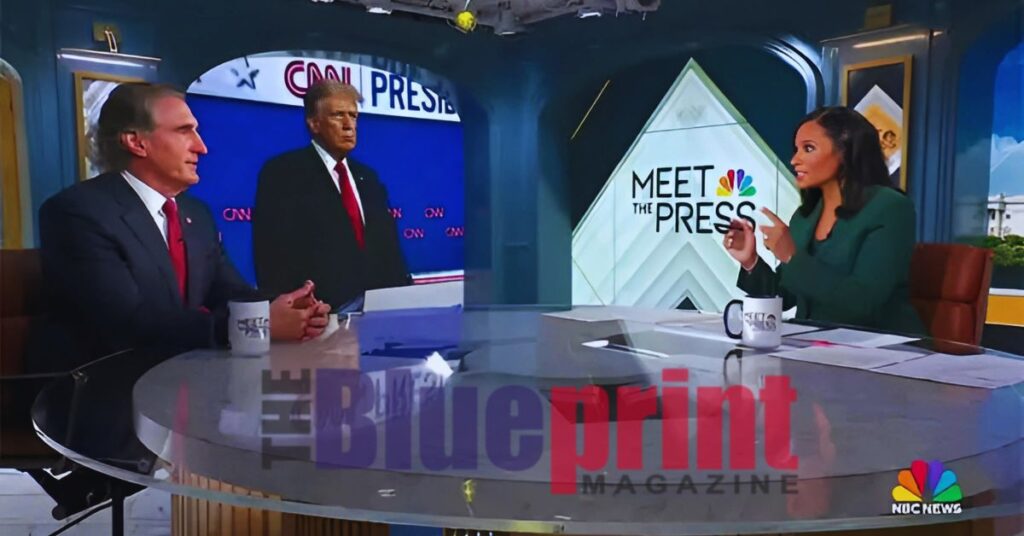Meet the Press, the longest-running show in American television history, continues to provide sharp political insight and in-depth discussions on global issues. Hosted by Kristen Welker, Season 76, Episode 49 tackled some of the most critical topics in the current political landscape, including the Ukraine-Russia conflict, the 2024 U.S. presidential election, and the evolving strategies of the Republican Party. This episode, featuring interviews with Ukrainian President Volodymyr Zelenskyy, U.S. Secretary of State Antony Blinken, and Republican National Committee Chairwoman Ronna McDaniel, was both informative and thought-provoking, offering viewers a well-rounded understanding of current global and national issues.
Let’s dive deeper into the key takeaways from this engaging episode of Meet the Press.
The Legacy of Meet the Press
Since its inception in 1947, Meet the Press has been a cornerstone of political journalism in America. Starting as a radio program before moving to television, it became a platform where political figures could be held accountable and where critical conversations could unfold. The show has witnessed and documented key historical moments, from the civil rights movement to the Watergate scandal. Over the decades, it has established itself as a trusted source for bipartisan discussions and in-depth interviews with global leaders.
Kristen Welker, now leading the program, brings her expertise and a fresh perspective to the role, maintaining the show’s reputation for hard-hitting interviews. In a political climate that’s increasingly polarized, Meet the Press continues to foster meaningful discussions on critical issues facing both the United States and the world.
Key Interviews and Discussions
President Zelenskyy’s Appeal for Global Support
One of the standout moments of this episode was the interview with Ukrainian President Volodymyr Zelenskyy. With the Ukraine-Russia conflict ongoing, Zelenskyy’s appearance was a direct plea to the international community. He emphasized the importance of continued military and humanitarian support to help Ukraine defend its sovereignty. Zelenskyy’s message was clear: Ukraine cannot fight alone and needs the international community’s backing to stand against Russian aggression.
Zelenskyy highlighted the human cost of the conflict, sharing the immense challenges Ukrainians face daily, from civilian casualties to infrastructural devastation. He called for more sophisticated weaponry and financial aid to rebuild war-torn regions, and he also underscored the need for diplomatic interventions to bring about a peaceful resolution. His emotional appeal aimed to keep Ukraine at the forefront of global attention, stressing the broader implications of the conflict for global democracy and stability.
Secretary Blinken on U.S. Commitment to Ukraine
Secretary of State Antony Blinken’s interview provided critical insights into U.S. foreign policy regarding the Ukraine conflict. Blinken reiterated the United States’ unwavering support for Ukraine, emphasizing that American aid goes beyond military assistance—it also includes economic and humanitarian relief. He discussed the importance of maintaining international sanctions against Russia as a way to weaken its war effort and hold the country accountable for its actions.
Blinken also addressed concerns about escalating tensions with Russia, explaining that while the U.S. is committed to defending Ukraine, it is equally focused on avoiding a direct military conflict with Russia. He emphasized diplomacy and coalition-building with NATO allies, reinforcing the U.S.’s role in leading global efforts to protect Ukraine’s territorial integrity.
Chairwoman McDaniel’s Take on Republican Foreign Policy
Chairwoman Ronna McDaniel’s appearance shed light on the Republican Party’s stance on international issues, particularly its approach to the Ukraine conflict. She reaffirmed the party’s opposition to Russia’s actions and voiced strong support for Ukraine. McDaniel made it clear that Republicans prioritize strengthening national security while maintaining America’s global leadership in promoting freedom and democracy.
McDaniel also provided insight into how the GOP plans to position itself on foreign policy ahead of the 2024 elections. Her remarks revealed a focus on balancing America’s international obligations with its domestic interests. She highlighted the need for a clear and strong foreign policy that deters aggressors while ensuring that American resources are used efficiently.
Reflections on the Political Climate
The Ukraine Crisis
The episode’s focus on the Ukraine crisis highlighted the gravity of the ongoing conflict and its implications for global stability. Discussions with Zelenskyy and Blinken made it clear that this is not just a regional issue but a pivotal moment for international relations. The U.S.’s involvement underscores the importance of supporting global allies in times of crisis, reinforcing the broader commitment to defending democratic values worldwide.
Zelenskyy’s and Blinken’s remarks also brought attention to the humanitarian disaster unfolding in Ukraine, raising concerns about the long-term economic and social impact of the war. As the conflict drags on, the world is watching to see how diplomatic and military efforts will evolve, and this episode of Meet the Press made it clear that there are no simple solutions.
2024 Presidential Election
The episode also turned attention to the rapidly approaching 2024 U.S. presidential election. With political divisions growing deeper, the stakes are high for both major parties. The interviews offered a glimpse into the strategies and narratives that will likely dominate the campaign trail. The Republican Party, as represented by Chairwoman McDaniel, is positioning itself as strong on national security and ready to defend American interests both at home and abroad.
However, the political climate is uncertain, and voter priorities are constantly shifting. Issues like foreign policy, economic stability, and healthcare are likely to shape the election. The episode hinted at the intense political battles to come, as candidates on both sides prepare to address the concerns of an increasingly divided electorate.
Republican Party Dynamics
McDaniel’s discussion revealed insights into the internal workings of the Republican Party as it prepares for the 2024 election. The party faces challenges, including maintaining unity amid differing views on key issues such as immigration, foreign policy, and economic reform. McDaniel emphasized the need for the party to come together under a common platform to ensure success in the upcoming election.
The conversation also touched on the Republican strategy for gaining voter support, particularly among undecided and independent voters. McDaniel suggested that the GOP would focus on core conservative values while addressing modern concerns like inflation, healthcare, and national security.
Implications for the 2024 Election
Foreign Policy and Voter Perception
Foreign policy, especially in light of the Ukraine conflict, is set to play a significant role in shaping voter opinions in the 2024 election. Candidates who demonstrate a strong grasp of international relations and present clear plans for handling global crises may gain an edge in the eyes of voters. The episode highlighted how important it will be for candidates to not only address domestic concerns but also articulate their strategies for maintaining global leadership.
Republican Party Strategy
McDaniel’s appearance hinted at how the Republican Party may frame its message leading up to the election. With foreign policy, economic reform, and national security likely to be key talking points, the GOP will need to solidify its positions and present a united front to appeal to both its base and undecided voters. The party’s ability to address these issues effectively could play a critical role in determining its success in the election.
Voter Priorities and Media Influence
The episode underscored how media coverage of critical issues can shape voter priorities. With Meet the Press focusing on topics like the Ukraine crisis and domestic political tensions, these issues may become more prominent in voters’ minds. As the 2024 election draws closer, media narratives will likely influence public opinion, shaping how voters assess the strengths and weaknesses of the candidates.
Conclusion
Season 76, Episode 49 of Meet the Press was a powerful episode that tackled significant global and national issues. Kristen Welker’s interviews with President Zelenskyy, Secretary Blinken, and Chairwoman McDaniel offered viewers a comprehensive look at the challenges facing the world today. The discussions on Ukraine, the Republican Party’s foreign policy stance, and the upcoming U.S. presidential election provided valuable insight into the evolving political landscape. As the 2024 election approaches, these topics will undoubtedly remain central to the public discourse.
FAQs
What key topics were discussed in Meet the Press S76E49?
The episode focused on the Ukraine crisis, U.S. foreign policy, the 2024 presidential election, and internal Republican Party dynamics.
How did President Zelenskyy’s interview shape the conversation?
Zelenskyy made a strong appeal for continued international support, emphasizing the need for military aid, diplomacy, and humanitarian assistance to help Ukraine counter Russian aggression.
What insights did Secretary Blinken provide on U.S. foreign policy?
Secretary Blinken reinforced the U.S. commitment to supporting Ukraine while discussing the importance of diplomacy and coalition-building to resolve the crisis without escalating conflict with Russia.
What did Ronna McDaniel discuss regarding the Republican Party?
McDaniel emphasized the Republican Party’s strong stance on foreign policy, highlighting support for Ukraine and a focus on maintaining U.S. national security while preparing for the 2024 election.
How will these discussions impact the 2024 presidential election?
The topics discussed, especially foreign policy and national security, are likely to influence voter priorities and shape the narratives leading up to the 2024 election, with candidates needing to address both domestic and international issues effectively.



